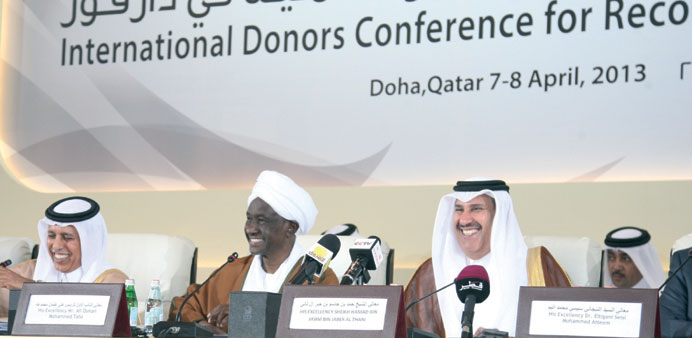HE the Prime Minister and Foreign Minister Sheikh Hamad bin Jassim bin Jabor al-Thani and HE the Deputy Prime Minister and Minister of State for Cabinet Affairs Ahmed bin Abdullah al-Mahmoud with Sudan’s First Vice President Ali Osman Mohammed Taha at the International Donor Conference for Reconstruction and Development of Darfur at the Doha Ritz-Carlton Hotel yesterday
|
|
Representatives of donor countries and aid groups, meeting in Doha, yesterday approved a mechanism to rebuild Sudan’s Darfur region after a decade-long conflict.
The total cost for Darfur’s reconstruction is estimated at $7.2bn. The Sudanese government is committed to $2bn whereas $5.245bn is expected to be pledged by the donors at the conference.
The director of the International Development Department at the Foreign Ministry, Ahmed bin Mohammed al- Meraikhi, said the mechanism was called the “funding and governance mechanism for the implementation of the Darfur development strategy”.
“The new mechanism will manage the financial commitments by the donors made to Darfur over the next six years,” he told the Qatar News Agency, describing it as flexible “because it allows for bilateral funding through governments or multilateral funding through organisations like the United Nations”.
According to al-Meraikhi, a number of parties have contributed to the placing of the new mechanism including the State of Qatar, the Sudanese government and the regional authority in Darfur in addition to the United Nations Development Programme, the World Bank and the United Nations-African Union Hybrid Mission in Darfur ( UNAMID) among others. The mechanism was studied in a workshop held in Doha before the two-day donors conference that ends today .
Working groups participating in the International Donor Conference for Reconstruction and Development of Darfur have set priorities for rebuilding the region on three major pillars: reconciliation and equality; reconstruction; and economic reinvigoration.
Tajeddin Bashir Niam, Darfur’s Minister of Development and Reconstruction, speaking on the sidelines of the conference, said reconstruction efforts needed $5bn, including $845mn for reconciliation and equality, whereas $1.4bn is needed for economic development.
Hundreds of international delegates have gathered at the Ritz-Carlton Doha to take part in the conference .
Chairing the meeting was HE the Deputy Prime Minister and Minister of State for Cabinet Affairs Ahmed bin Abdullah al-Mahmoud, who gave the floor to HE the Prime Minister and Foreign Minister Sheikh Hamad bin Jassim al-Thani for opening remarks.
Among the important speakers were UN secretary general’s representative, Ali al-Zatari; UNAMID chief Mohamed bin Chambas; Organisation of Islamic Co-operation secretary general o Ekmeleddin Ihsanoglu; Arab League secretary general Nabil al-Arabi; Turkish Deputy PM Bekir Bozdag; Darfur Regional Authority (DRA) chairman Tijani el-Sissi; and Sudanese Vice President Ali Osman Taha.
Speaking on the “historic” achievement of signing of the final peace and co-operation agreement between the Sudanese government and JEM under the Doha Document for Peace in Darfur, HE Sheikh Hamad bin Jassim expressed “utmost optimism” for the future of Sudan.
“The war is over and there are just simple skirmishes here and there but they too will be solved. War is gone forever in Darfur and the region is now ripe to receive international and Arab support,” he said.
Ban Ki-moon’s representative relayed the UN’s appreciation and support of Qatar’s efforts to stabilising the region, adding that there are a “lot of indicators that show Darfur has a bright future” .
UNAMID’s Chambas ensured that the organisation’s forces would continue to foster security and make sure that the Darfur mission was realised, “but that it’s a team effort”.
Britain pledged at least $16.5m for Darfur annually over the next three years which will come in the form of agricultural upgrades, skills training and access to financing.
“It is not good enough to simply offer more handouts,” UK international development minister Lynne Featherstone said. “Our aid will help the poorest to get the help they need to stand on their own and make them better able to cope when crises occur.”

